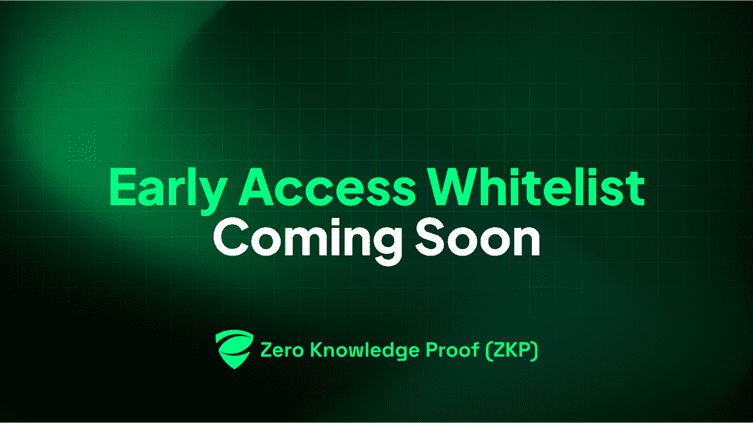Analysts Highlight Rising Interest in the Zero Knowledge Proof (ZKP) Whitelist

Zero Knowledge Proof (ZKP) has become a focal point of conversation in crypto circles, as analysts note increasing curiosity around its whitelist phase. Positioned at the frontier of artificial intelligence and blockchain, the project stands out for its emphasis on verifiable computation, data integrity, and user privacy. As anticipation builds, many view Zero Knowledge Proof (ZKP) as one of the more promising upcoming crypto ICO initiatives combining decentralized architecture with cryptographic precision.
The project’s whitelist has sparked attention from both privacy advocates and investors seeking projects with measurable value and real utility. Its integration of AI workload distribution and data sovereignty has distinguished it from typical speculative tokens, setting a precedent for upcoming presale crypto discussions. As prelaunch excitement grows, observers suggest that the project’s focus on transparency, fairness, and privacy could position it among the notable developments in decentralized AI infrastructure.
A Framework Built on Verifiable Intelligence
At its core, Zero Knowledge Proof (ZKP) represents an advanced model for how artificial intelligence can operate within a decentralized environment. It introduces a structure where computation and data management are distributed across multiple nodes instead of being controlled by centralized entities. This system ensures scalability, fairness, and performance consistency without exposing sensitive information or user data.
The project’s Proof of Intelligence and Proof of Space mechanisms form the foundation of its design, enabling both compute and storage tasks to be validated independently. This creates a self-sustaining loop of accountability where nodes must demonstrate tangible contributions. By ensuring that each participant’s work is verifiable, the Zero Knowledge Proof (ZKP) network aims to foster reliability and equality within its operational structure.
This commitment to measurable output resonates across the analyst community, as it represents a practical evolution in blockchain computation. Rather than focusing purely on token movement or speculative growth, Zero Knowledge Proof (ZKP) has prioritized a verifiable, performance-based system that reinforces trust among contributors and developers alike.
Privacy as the Core Differentiator
One of the strongest factors driving interest in the whitelist is the project’s cryptographic foundation. Zero Knowledge Proof (ZKP) enables computations to be verified without revealing the underlying data. This functionality is particularly valuable in fields where confidentiality is essential, such as artificial intelligence model training or proprietary data sharing.
This capability, combined with its dual consensus model, creates a balanced environment for secure AI computation. Investors have shown growing appreciation for blockchain projects that offer privacy without sacrificing scalability, and Zero Knowledge Proof (ZKP) has emerged as a case study in that direction. Analysts note that this dual focus on privacy and performance is one reason its whitelist has gained attention among early supporters and industry experts.
The project’s privacy-preserving structure also aligns with an increasing regulatory demand for user data protection. By allowing computations to occur over encrypted inputs, Zero Knowledge Proof (ZKP) maintains compliance with global standards while keeping user trust intact. This combination of practicality and compliance has become a talking point across upcoming presale crypto communities monitoring its progress.
Whitelist Momentum and Market Conversation
The momentum surrounding the Zero Knowledge Proof (ZKP) whitelist continues to grow as discussions expand across investor networks and research channels. For many analysts, the whitelist is more than just a registration phase; it represents an early entry point into a concept that addresses some of blockchain’s most persistent challenges. Its relevance within decentralized AI computation and privacy frameworks has attracted both technical and strategic interest.
The ongoing discussions emphasize how the whitelist signals broader community engagement. Many investors view it as an opportunity to participate in an ecosystem designed around measurable contributions, cryptographic proof, and equitable distribution. As conversations around upcoming crypto ICO projects evolve, Zero Knowledge Proof (ZKP) has managed to stand apart by framing its whitelist as part of a long-term architecture rather than a short-term campaign.
The project’s approach has also been highlighted for its potential to support decentralized collaboration at scale. With AI development requiring both computational efficiency and trust, Zero Knowledge Proof (ZKP) provides an avenue for contributors to engage without compromising their intellectual property. This has added credibility to the project’s early momentum and has been cited as a major reason why interest in the whitelist has intensified ahead of the presale.
The prelaunch buzz is being driven by consistent engagement across research groups and social discussions that focus on privacy innovation within crypto. With analysts recognizing it as one of the notable upcoming presale crypto names, Zero Knowledge Proof (ZKP) continues to be framed as a balanced blend of practicality, technical depth, and forward-looking design.
Closing Analysis
The attention surrounding the Zero Knowledge Proof (ZKP) whitelist underscores how the market is shifting toward substance-driven blockchain projects. Its model, rooted in verifiable computation and privacy-centric architecture, represents a refined direction for decentralized AI systems and data governance.
As anticipation continues to grow, the Zero Knowledge Proof (ZKP) prelaunch is shaping up to be a focal point of the upcoming crypto ICO landscape. By merging the reliability of cryptographic validation with a fair and distributed model, the project’s whitelist has become a symbol of what next-generation blockchain initiatives aim to achieve: balance, security, and trust.
Find Out More At:





